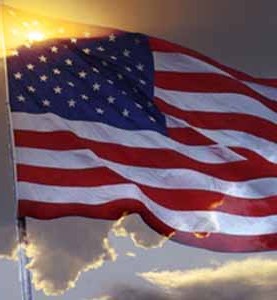|
Freedom's Price
She had placed them in coffee cans and tall juice cans that she had covered with aluminum foil. I was too young to know very much about flowers but I did recognize the irises and peonies or "pineys" as Grandma called them. Daddy had already mounted the American Flag on the pole that extended from the side of the house and he was loading the huge box full of flowers into the trunk of the car. I noticed the flag unfurling in the soft breeze as we all got into the car and drove down the lane to get Grandma. If she was well enough, she always went with us every year on this important outing. I sat in the front seat of the car, in the middle, between Daddy and my brother. Mama sat in the back beside Grandma and down the road we went because it was Decoration Day and the day our whole family went to the cemeteries. The first stop was Linville Cemetery, a beautiful place with huge old oak trees with branches that seemed to protect the inhabitants of the cemetery with their wide boughs. We had relatives buried at Linville and we all got out of the car and walked the short distance to grave sites. Everyone was quieter and Mama reminded us to be respectful because we were to honor the final resting places of those buried in the cemetery. Mama placed some of the flowers on the graves and she and Daddy spoke about some of the relatives and told us children a little about each one. There were many small American flags at grave sites across the cemetery. Daddy and Mama talked about how those flags were placed there by veteran organizations to honor the soldiers who had served our country, many of them giving their lives to keep our country free. Next, we drove what seemed to me to be a very long way. It was where Daddy's relatives, including his parents and grandparents, had been buried. As we got out of the car, I looked up to see the familiar little white church with the name, Eucebia, written high up near the gabled roof. Church services were no longer held at Eucebia but I was allowed to go inside and look around. Churches were never locked back then because people had respect for the things of God whether they attended church or not. Behind the church was the cemetery. It had been recently mowed and once again I could see those small American flags waving in the breeze over several of the graves in the cemetery. Daddy made sure to come in April or early May to be certain that the grave plots were looking good for Decoration Day when many people visited the cemeteries. Again, Mama placed flowers on all the graves of our relatives while Daddy showed me his brother Arthur's grave. He had died when he was just one year old in an accident. Daddy didn't remember him because he was one of the oldest of ten children and Daddy was the youngest child. Yet, he always paused a moment in front of Arthur's grave to pay his respects and place a flower there for the brother he never got to know in this life. We also attended the Memorial Day service that was held every year at the county courthouse. The American Flag seemed to be everywhere on that day. Many homes displayed the flag and the courthouse yard was encircled with them. There was usually a special speaker, readings, salutes, and then with heads bowed a bugler would play Taps that was echoed in the distance by another bugler. Daddy never missed a Memorial Day service because he was a veteran of WWII and it was important to him to give honor to those who had given their lives for our country. He was a member of the American Legion and the VFW and, later in life, he became a veterans service officer, a job that he held dear until the day the bugle sounded at his own grave site. It is important for us to teach our children and grandchildren the meaning for the observance of the Memorial Day so they will know the price that has been paid for their freedom. It only takes one generation of neglect to forget valuable teachings of the past. |



